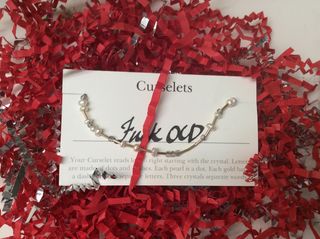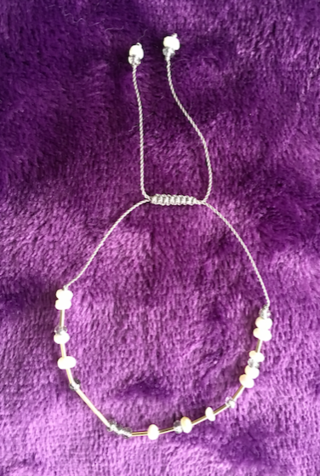OCD
The Hidden Power of Swearing at Your OCD
Three ways to use the art and science of cursing to power up your recovery.
Posted November 3, 2017
Today I’m going to propose something that you might find offensive, but in the spirit of exposing myself to uncertainty, the very foundation of exposure and response prevention (ERP) therapy for OCD, I’m going to propose it anyway.
Start swearing at your OCD.
Swearing at OCD comes naturally to me, as I’ve been a potty mouth since I was a teenager, quietly and gleefully muttering as-needed swear words under my breath so that the adults in earshot couldn’t hear.
It wasn’t until a few years ago, however, when I opened a gift from a good friend of mine and a member of my OCD support group, that I realized the full potential power of my profanity. The gift was a Curselet, a bracelet where delicate freshwater pearls, gold bars, and crystals serve as the dots, dashes, and spaces of Morse code, spelling out the beautifully appropriate profanity of “F**k OCD.” (Except, I will note, that “F**k “ was written out in Morse code in all its profane glory!)

“Right on!” I thought when I opened this perfect gift for a potty mouth, immediately putting it on, admiring the way it sparkled mischievously. I was wearing profanity, and no one would ever know! It was like swearing quietly in front of adults all over again—what fun! what power!
And what a great attitude to take toward a disorder that, before I found ERP, the evidence-based treatment for OCD, had ripped up the very foundations of my life.
“F**k OCD!” I said out loud, savoring the profane deliciousness of the words. “Damn if this isn’t the best gift ever!”
Swearing How-Tos
How can you power up your recovery by swearing at your OCD? There are undoubtedly countless fun ways with innumerable swear words, but I’ll offer two quick suggestions based on my Curselet to get you started:
- Say “F**k OCD!” as you do exactly the opposite of what it wants. Does your OCD want you to avoid going out with your friends because it might trigger thoughts that your sexuality is not what you thought it was? Say, “F**k OCD! I’m going anyway!”
- Use “F**k OCD” in your imaginal exposure scripts. Imaginal exposure scripts help keep the uncertainty of the obsessions in your mind while interrupting insidious mental compulsions.* For instance, continuing our example from above, you can say to yourself as you’re out with your friends, “I think I find that person attractive. That means I may or may not be gay/straight [fill in the blank based on what your OCD’s afraid of]. I’m tired of my f**king OCD ruining my life, so I’m going to stay here with my friends and embrace the uncertainty of not knowing my sexuality for sure. I may or may not be straight/gay.”
The Science of Swearing
Can you see how powerful swearing at your OCD can be? And this isn’t just the case of a potty mouth trying to validate her own profanity; researchers have also identified that swearing can be good for us, as summarized in the New York Times article, The Case for Cursing, by Kristin Wong.
According to studies referenced in the article, swearing can help us tolerate pain better, and boy, can OCD cause a tremendous amount of mental pain. Another suggests that swearing might make us physically stronger. It definitely makes me feel stronger to curse at my OCD!
Most important in my mind is that cursing can serve as a connection with others. All the women in my OCD support group have a “F**k OCD” Curselet, and it binds us together in our work to keep our lives as free of OCD as possible.

A member of the group and I went through a rough patch with our OCD a few months back and both realized we’d broken our F**k OCD bracelets. We joked that maybe it wasn’t the ERP that had been helping us stay in recovery all these years; maybe wearing our bracelets was what was making us better! (How’s that for magical thinking!) I ordered a replacement for both of us, but not because of any magical OCD content. Instead, because I like knowing that all of us in our group wear it, that all of us have the world’s tenth most disabling condition (Murray & Lopez, 1996), and that all of us, including you reading this blog post right now, are fighting OCD together.
If you'd like to learn more about Curselets, you can visit their website.
*To learn more about imaginal exposure/scripting, see chapter 13 "From Adversity to Advocacy" of Is Fred in the Refrigerator? Taming OCD and Reclaiming My Life.
For notifications of new blog posts as well as OCD-taming tips & resources, sign up for my Shoulders Back! newsletter.
References
Murray, C. J. L., & Lopez A. D. 1996. The Global Burden of Disease. Cambridge, MA: Harvard University Press.


